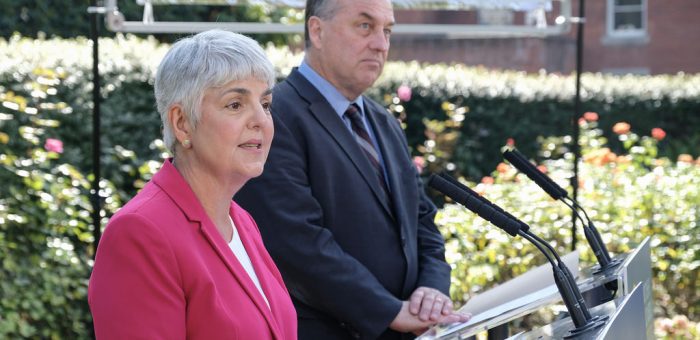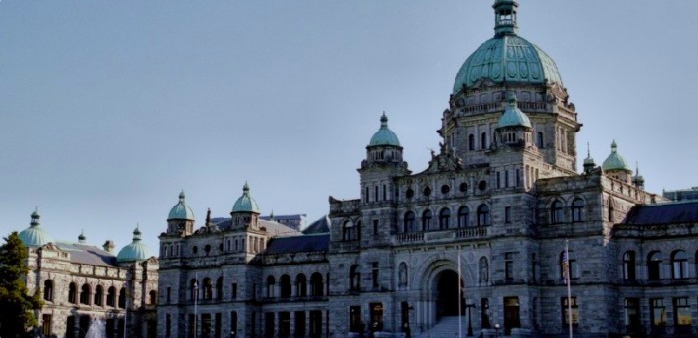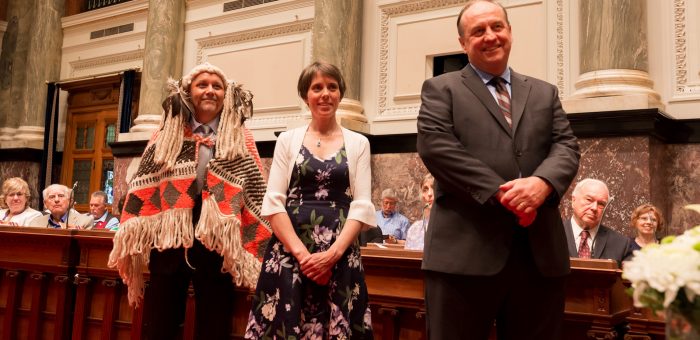Legislation
When ideology trumps evidence: The decision to cancel the school liaison officer program in School District 61
On May 31, 2023 and in what can only be described as a textbook example of ideological decision-based evidence-making, Trustees voted unanimously to cancel the school liaison officer (SLO) program in all School District 61 (SD61) schools (the only school district in BC to do so). The Vancouver School Board, which had previously eliminated school liaison officers in 2021, reinstated them in September 2023.
Remarkably, the SD61 decision was reached without consultation with any Police Board in the region or the leadership of either the Esquimalt or Songhees First Nations. In support of their decision, School Board Chair, and former BC Green candidate for Oak Bay-Gordon Head, Nicole Duncan demonstrated a fundamental misunderstanding of the role of SLOs and the community policing model (ironically in a community she wanted to represent in the BC Legislature) by stating “Police are being asked to fill in gaps in student support and to take on roles that should be filled by individuals with specialized expertise, such as youth and family counsellors and social workers“.
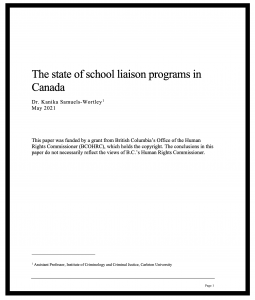 The SD61 decision built on a bizarre press release issued by the BC Office of the Human Rights Commissioner on November 22, 2022: Letter to school trustees on human rights concerns with the use of School Liaison Officers in B.C. schools. While obviously an overreach of the mandate of the unelected BC Human Rights Commissioner, she stated “I strongly recommend that all school districts end the use of SLOs until the impact of these programs can be established empirically. ” I was serving on the the Oak Bay Police Board at the time and was very familiar with Oak Bay’s community policing model and the important preventative role that school liaison officers play in such a model. I had hoped the Human Rights Commissioner letter was supported by extensive research on SLOs in BC Schools. Sadly, all that I could find was a single report commissioned by her office known as the Samuels-Wortley report.
The SD61 decision built on a bizarre press release issued by the BC Office of the Human Rights Commissioner on November 22, 2022: Letter to school trustees on human rights concerns with the use of School Liaison Officers in B.C. schools. While obviously an overreach of the mandate of the unelected BC Human Rights Commissioner, she stated “I strongly recommend that all school districts end the use of SLOs until the impact of these programs can be established empirically. ” I was serving on the the Oak Bay Police Board at the time and was very familiar with Oak Bay’s community policing model and the important preventative role that school liaison officers play in such a model. I had hoped the Human Rights Commissioner letter was supported by extensive research on SLOs in BC Schools. Sadly, all that I could find was a single report commissioned by her office known as the Samuels-Wortley report.
I thoroughly reviewed the Samuels-Wortley report. It provides a literature review of studies pertaining to SLO programs in Canada and the United States. First, it’s important to note that the author states on page 3 of her report “an extensive review of the literature reveals no peer-reviewed studies that explore the impacts of Canadian SLO programs on marginalized students.” In fact, one of the five peer-reviewed Canadian studies the author found pertaining to Canadian SLOs suggested positive outcomes when introduced as a component of a community policing model (Broll and Howells, 2019).
 The US-based research reviewed in the Samuels-Wrotley report focussed on the “school-to-prison” pipeline, violence, US-based SLO training protocol etc. and cannot be generalized to Canada. Even the Toronto Police internal evaluation reviewed in the Samuels-Wortley report is not generalizable to Greater Victoria as they were assessing a targetted SLO program introduced after the fatal shooting of a student at a Toronto high school, not as a key component of a community-policing framework.
The US-based research reviewed in the Samuels-Wrotley report focussed on the “school-to-prison” pipeline, violence, US-based SLO training protocol etc. and cannot be generalized to Canada. Even the Toronto Police internal evaluation reviewed in the Samuels-Wortley report is not generalizable to Greater Victoria as they were assessing a targetted SLO program introduced after the fatal shooting of a student at a Toronto high school, not as a key component of a community-policing framework.
The SD61 decision was also supported by a thoroughly debunked letter from the Greater Victoria Teacher’s Association who had apparently not surveyed their members before coming up with their supposedly (but clearly not) researched ideological position. On the other hand, the Victoria Principals’ and Vice Principals’ Association, whose members are in charge of individual school management wrote a strong letter of support for SLOs to the Board of Trustees that was apparently ignored.
What’s most odd about the GVTA letter is that in April 2018, when I was serving in the BC Legislature as the MLA for Oak Bay-Gordon Head, Victoria Police cut their SLO program after not being given the resources to maintain their frontline services. By December 2018, the Greater Victoria Teacher’s Association began a campaign to get police liaison officer’s back in Victoria Schools that continued into 2019 as school-based incidents started to rise. The GVTA’s dramatic policy lurch strikes me as a textbook example of what happens when one or two idealogues start ramming through their agenda while claiming to speak on behalf of the collective.
 Rather than choosing to consult with those delivering or providing oversight into the SLO program, School Board Trustees seemed to be swayed by those purporting to have uncovered gotcha evidence from FOI information they received. The egregious misinformation brought forward in this regard provided the “evidence” to support the ideological narrative needed to justify a predetermined decision (so-called decision-based evidence-making) to eliminate SLOs from SD61 schools. For example, on X (formerly known as Twitter), one activist offered gotcha ‘proof’ that VicPD were targeting members of the BIPOC community. They pointed out that 19% of all “youth suspects” arrested by VicPD were indigenous whereas only 5% of the population was indigenous. What they failed to point out was that the data they were looking at was aggregate rather than individual data. To illustrate this, suppose there were 100 arrests & one BIPOC individual committed 19 of them. Suppose the other 81 were committed by 81 different other folk. Then the statistic is only 1.2% of people VicPD labeled as “youth suspects” were BIPOC. Perhaps the activists would have served our community better if they educated themselves on the data before making incorrect assertions.
Rather than choosing to consult with those delivering or providing oversight into the SLO program, School Board Trustees seemed to be swayed by those purporting to have uncovered gotcha evidence from FOI information they received. The egregious misinformation brought forward in this regard provided the “evidence” to support the ideological narrative needed to justify a predetermined decision (so-called decision-based evidence-making) to eliminate SLOs from SD61 schools. For example, on X (formerly known as Twitter), one activist offered gotcha ‘proof’ that VicPD were targeting members of the BIPOC community. They pointed out that 19% of all “youth suspects” arrested by VicPD were indigenous whereas only 5% of the population was indigenous. What they failed to point out was that the data they were looking at was aggregate rather than individual data. To illustrate this, suppose there were 100 arrests & one BIPOC individual committed 19 of them. Suppose the other 81 were committed by 81 different other folk. Then the statistic is only 1.2% of people VicPD labeled as “youth suspects” were BIPOC. Perhaps the activists would have served our community better if they educated themselves on the data before making incorrect assertions.
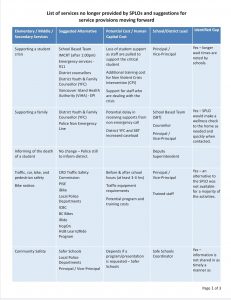 In another example, a powerpoint presentation to a School District committee on SLOs seemed to have been particularly influential even though none of the purported “gotcha” statistics were checked with VicPD and most were misinterpreted. Sadly with gangs now having increased access to schools, vulnerable youth become easy victims for grooming into gang life. But that’s not the only consequence of the irresponsible School Board decision. Here’s an incomplete list of what the Board has identified as services the SLOs used to provide that now fall into the responsibility of already overburdened principals and vice-principals, along with the District’s lone Safe Schools Coordinator. This list also illustrates the challenges faced by schools and students since the removal of the SLOs.
In another example, a powerpoint presentation to a School District committee on SLOs seemed to have been particularly influential even though none of the purported “gotcha” statistics were checked with VicPD and most were misinterpreted. Sadly with gangs now having increased access to schools, vulnerable youth become easy victims for grooming into gang life. But that’s not the only consequence of the irresponsible School Board decision. Here’s an incomplete list of what the Board has identified as services the SLOs used to provide that now fall into the responsibility of already overburdened principals and vice-principals, along with the District’s lone Safe Schools Coordinator. This list also illustrates the challenges faced by schools and students since the removal of the SLOs.
• Longer wait times accessing crisis support for students.
• Loss of student support as staff are pulled to support the critical student.
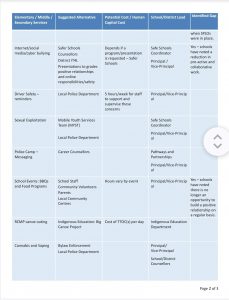 • Additional training cost for Non-Violent Crisis Intervention (CPI).
• Additional training cost for Non-Violent Crisis Intervention (CPI).
• Support for staff dealing with the crisis.
• Delays in receiving supports from police departments nonemergency calls.
• District Youth and Family Counsellor (YFC) and School-Based-Team (SBT) increased caseload.
• Alternatives are not available for a majority of activities.
• Additional program, training, and equipment costs.
• Information around community safety is not being shared in a timely manner.
• Reduction in pro-active and collaborative work around internet/social/media/cyber bullying.
• No longer an opportunity to build a positive relationship on a regular basis.
• Increase in vandalism and graffiti on school grounds.
• Students no longer have an opportunity to learn through a police focused lens.
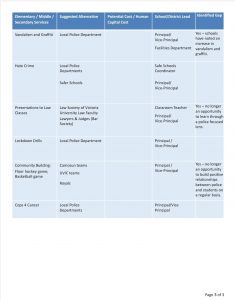 • There is no longer an opportunity to build positive relationships between police and students on a regular basis.
• There is no longer an opportunity to build positive relationships between police and students on a regular basis.
The following programs or presentations are missing from this list that the District provided:
• Gangs in (BC)
• Personal Safety
• Female Personal Safety
• Halloween Safety
• Healthy/unhealthy Relationships
• Human Trafficking
• LGBTQ Presentations
• PARTY program
• Property & Vehicle Crime
• Shoplifting
• Stranger Danger
• Street Drugs
• WITS program
• Mentor individual students
While at present, the Board of Education is certainly within its right to ban SLOs from their schools, community safety falls within provincial and local government jurisdiction. My hope is that the province will step in to rectify what has happened in SD61 through the introduction of legislation or regulation to ensure that such ill informed decisions cannot occur in the future without either provincial approval or consultation with the affected police boards (charged with oversight of policing). Nobody’s interests are served when our collective safety is undermined by poorly thought through decisions that are grounded in nothing more than ideology and virtue signalling.
I wish to offer my sincere thanks to all police officers in our region for their continued service to our community. I can only imagine how decisions like this, based on nonsensical rhetoric and misleading information, affect your morale. Yet the same activists undermining our region’s policing would almost certainly be the first ones to call for your help when a problem arises. Finally, I can’t imagine how police officers feel as they go to pick their children up at school while dressed in uniform knowing that new school district policy requires schools to log when officers are on school property.
Shame on the Greater Victoria School Board.
Effective today, BC businesses can now incorporate as Benefit Companies
In May 2019, my private Member’s bill: Bill M209: Business Corporations Amendment Act, 2019 received royal assent but required an Order in Council to become enacted. That happened today. I’m delighted to report that effective immediately, the province is now officially the first jurisdiction in Canada to allow companies to incorporate as benefit companies.
As you will see from the government press release (that I reproduce below) I was pleased to sponsor this bill and to collaborate with government to see it become the first ever opposition private members’ bill passed into law in B.C. Our province is home to incredibly innovative companies that want to play a larger role in addressing the challenges and opportunities we face. This legislation helps position our province to be a leader on the cutting edge of global economic trends. By becoming the first jurisdiction in Canada to create benefit companies, B.C. can position our economy for success as we work to recover from the impacts of COVID-19 and beyond.
My bill amended the Business Corporations Act to create a new Part 2.3 that enabled companies to become benefit companies. These companies will have to meet certain requirements, including:
- Committing in their articles to operate in a socially responsible and environmentally sustainable manner, and to promote specific public benefits;
- The directors must act honestly and in good faith to pursue public benefits and consider the interests of persons affected by the company’s conduct
- Reporting publicly against an independent third party standard.
The choice to become a benefit corporation status is completely voluntary and has no impact on other existing corporations, other corporate forms, taxes or government regulation
It’s generally recognized that Canadian corporate law does not have a strict “shareholder primacy” rule as the US does, so directors of companies in Canada have more discretion to pursue a broader mandate beyond maximizing shareholder profits. However, this legislation was needed to
- Provide clarity for directors and shareholders about the nature and mandate of the company – avoid the risk of a shareholder challenge regarding the director’s duties;
- Provide certainty for impact investors of the nature and mandate of the company;
- Enable companies to attract capital while being true to their mission as they grow;
- Protect the vision of the founders of benefit companies from shareholder challenges;
- Provide a simple framework for companies to adhere to that is legally and commercially recognized.
This legislation also encourages more companies to pursue a socially responsible and environmentally sustainable approach to business, creating beneficial outcomes for society as a whole and leveraging the power of business to help us to tackle significant social and environmental challenges.
Below I reproduce government’s press release issued today. I am grateful to the Minister of Finance, the Legislative drafters, and Sarah Miller, a researcher in the BC Green Caucus, that I worked closely with in developing this legislation.
Government Press Release
New business option empowers companies to give back
For Immediate Release
2020FIN0038-001197
June 30, 2020
Ministry of Finance
VICTORIA – Through historic and collaborative legislation, British Columbia is the first province in Canada to create the option of benefit companies, a new way to do business that benefits people, communities and future generations.
“As government, we’re proud to support B.C. businesses that not only want to do well for their stakeholders, but also give back to their communities in important ways,” said Carole James, Minister of Finance. “By providing the framework through legislation, benefit companies will help propel B.C.’s economy into the future, grounded by the values and beliefs that define us as British Columbians. This is especially important now, as we work to build back better from the impacts COVID-19. I want to thank independent MLA for Oak-Bay Gordon Head Andrew Weaver and my colleagues in the third party for being champions of this new business structure from day one.”
Changes to the Business Corporations Act give British Columbians a new option when choosing a corporate structure for their business. A benefit company is a for-profit corporation committed to conducting its business in a responsible and sustainable manner, as well as promoting public benefits in addition to serving the interests of its shareholders. For example, the benefits could be artistic, charitable, cultural, economic, educational, environmental, literary, medical, religious, scientific and/or technological.
“I was pleased to sponsor this bill and to collaborate with government to see it become the first ever opposition private members’ bill passed into law in B.C.,” Weaver said. “Our province is home to incredibly innovative companies that want to play a larger role in addressing the challenges and opportunities we face. This legislation helps position our province to be a leader on the cutting edge of global economic trends. By becoming the first jurisdiction in Canada to create benefit companies, B.C. can position our economy for success as we work to recover from the impacts of COVID-19 and beyond.”
A business that becomes a benefit company must:
- specify its public benefit goals in its articles of incorporation, allowing investors to determine if the stated public benefit aligns with their investment and social goals;
- complete and publish an annual benefit report assessing the company’s performance in its promotion of its stated public benefits;
- compare its progress against an independent, third-party standard;
- share the report publicly by making it available at the company’s records office and on the company’s website, if it has one; and
- require the company’s directors to balance the commitments in the benefit provision with their duty to act in the best interests of the company.
“Our work to expand and modernize BC Registries has played a key role in bringing this exciting legislation to life,” said Anne Kang, Minister of Citizens’ Services. “Allowing businesses to register as benefit companies gives them more tools to help improve our communities and the well-being of people. This initiative is another step forward in our work to deliver modern, reliable and easy-to-access services for British Columbians, where and when they need them.”
These amendments ensure that B.C. companies committed to considering the impact of their decisions are able to balance the needs of their shareholders with the values of British Columbians.
The values of collaboration, partnership and public good are foundational to the Confidence and Supply Agreement with the BC Green Party caucus, and it continues to provide the basis for a strong, stable government for British Columbia. By working together, progress continues to be made on shared priorities, like climate change, tackling the housing crisis and building a sustainable economy that works for everyone.
Quick Facts:
- Benefit companies were first introduced in 2010 in the United States and are now possible in 35 U.S. states, as well as Italy and Colombia.
- On May 16, 2019, the Business Corporations Amendment Act (No. 2) received royal assent.
- This is the first private member’s bill from an opposition party to be passed directly into law in B.C.
Learn More:
To learn more about the amendments, visit: www.bclaws.ca/civix/document/id/bills/billsprevious/4th41st:m209-1/search/CIVIX_DOCUMENT_ROOT_STEM:(Business%20Corporation)%20AND%20(benefit)?1#hit1
Why I support and will vote for BC Government Budget 2020
On Thursday this week members of the BC Legislature will vote on the BC NDP’s 2020 budget.
The BC NDP’s 2020 budget continues to build on the positive work done since my colleagues and I first signed the Confidence and Supply Agreement (CASA) in 2017. The Premier and I reiterated our ongoing support for the CASA agreement in letters we exchanged shortly after I left the BC Green Caucus to sit as an independent as their leadership race unfolds.
In my view, Budget 2020 delivers on multiple fronts by making investments which will benefit numerous demographic groups. And rather than becoming mired in politically expedient short-termism, the budget charts a path forward to an economy centered around sustainable development and innovation.
This budget reflects many of our shared priorities. While no budget will please everyone, and all budgets can be criticized for what’s not in them, taken together I am very pleased with what’s in Budget 2020 and look forward to supporting it in the upcoming vote.
Below I expand upon my media release from last week and provide further thoughts and reflections on Budget 2020.
Affordability
Currently, the high cost of living in urban areas in BC is putting the comfortable middle-class lifestyle enjoyed by previous generations out of reach for large segments of the population, and the government is addressing the issue by continuing to introduce measures designed to make life more affordable. The complete removal of MSP premiums should save a family of four $1,800 per year while raising the earnings exemption for those on income and disability should put more money back into the pockets of those who need it most.
I am absolutely thrilled to see the regressive form of taxation embodied in MSP premiums finally eliminated. I’ve been working towards this end since January 2015 when I first announced that the BC Green Party, if elected, would eliminate the MSP premium and replace it with a progressive form of revenue generation mirroring what was done in Ontario. Public support for this was overwhelming as indicated by the tens of thousands of British Columbians who signed petitions or emailed their MLAs, and by the fact that both the BC NDP and the BC Liberals eventually also embedded a promise to eliminate MSP premiums in their 2017 election platforms.
Ongoing funding increases to childcare in BC should help to alleviate an economic stress for young families while benefiting the entire economy through greater female participation in the labour force, families with more disposable income, and the creation of jobs related to early childhood care.
On the housing front, the combination of the speculation tax (which I spent much time working on collaboratively with the Finance Minister to ensure it was razor focused on urban speculation) and the construction of affordable housing should bring unit costs down, but these measures need to be combined with continued conversations with municipalities about ways to increase density to most effectively deal with the housing crisis. Further work is needed to combat underemployment (only 39,300 of the 65,400 jobs created last year were full-time) and to provide support to those dealing with addictions, homelessness, and mental health issues, but in a time of economic uncertainty the government is continuing to devote resources to ensuring that those who require assistance are able to get it.
Education and Youth
For years, BC has been the only province without an up-front, needs-based, post-secondary educational grant. The 2020 budget rectifies this situation by introducing the BC Access Grant. Making the grant up-front is especially important because it gives students immediate financial aid, allowing them to focus on their studies without the added stress of worrying about how they are going to pay tuition or loans. The grant will also be of medium-term economic benefit to the province, helping to address anticipated shortages of healthcare providers and workers equipped with the skills needed to power an economy driven by green energy and intangibles.
The growing number of students requesting access to on campus mental health supports has been well documented and the government has responded with the introduction of a new 24/7 mental health counselling service. This system will help to provide many students with the support they need to navigate the challenges of living away from home for the first time, the pressures induced by social media, and the financial stressors that come with being a student. The new support network is not panacea to the increasing number of young adults who experience mental health challenges, but its creation demonstrates that the government is taking students’ concerns seriously and is working to address them.
Additionally, after years of inadequate funding, the government is continuing to make investments into supplying the teachers, psychologists, and educational assistants needed to maintain our public education system’s status as one of the best in the world. Indeed, a primary driver of long-term economic growth, a well-educated, skilled workforce, can only be produced through investments into our public education system now.
Strong education systems correlate with positive health outcomes, greater social mobility, and higher levels of civic engagement. However, the mismatch between four-year political timelines and the time it takes to see the benefits of investments into education can create incentives for governments to shirk their responsibilities to adequately fund public education systems. By taking the long view and investing substantial resources into our education system now, the government is continuing to demonstrate that it is committed to sustaining our province’s prosperity.
Capital Projects and Innovation
Government choosing to make record-breaking investments into infrastructure projects while capital is cheap is a prudent choice which will help the province to deal with multiple immediate and looming challenges. Transportation related infrastructure projects such as the Pattullo Bridge replacement, Skytrain expansions, and additional HOV lanes should tackle pressures associated with continued urbanization and help to reduce congestion and pollution while facilitating the smooth flow of goods and services. Hospital overcrowding, another pressing issue in the province, promises to see relief through the construction and renovation of multiple hospitals. Additionally, the construction and renovation of numerous schools will assist areas of the province dealing with demographic pressures, and ongoing seismic upgrading is a much needed investment after years of delayed progress.
Innovative design and the integration of BC engineered wood products and energy/energy conservation systems into these capital projects demonstrates British Columbia’s ongoing leadership in recognizing that the reduction of greenhouse gas emissions can be paired with job creation throughout the province. Although it is true that the province’s debt will increase in order to finance these record-breaking capital projects, our debt to GDP ratio remains at a sustainable level.
I was also pleased to see that government is providing a roadmap to an economy with sustainability and entrepreneurship as its cornerstones, the importance of which I have emphasized to government in countless hours of discussions and negotiations.
We have the resources to transition to an innovation driven, low-carbon economy but businesses require the certainty that comes with a clear commitment from government to supporting emerging industries in order to feel comfortable investing in them. Although there are some measures which push in the opposite direction that I will continue to oppose, on balance, the province is signaling its commitment to supporting an emerging economy that realizes BC’s comparative advantages.
Measures such as targeted investments into the bioeconomy, the exemption of electric aircrafts and electric aircraft conversions from PST, and the pledge to establish a quantum computing institute all aid burgeoning industries capable of becoming areas of economic strength for the province. Ongoing incentives to purchase electric vehicles and charging stations are simple, smart demand-oriented policies which will continue to electrify transportation. More work is needed to encourage retrofitting and the development of renewable energy sectors which harness BC’s natural resources, but the province is well on its way to transitioning to the economy of tomorrow.
Rural Development
Rural areas of the province continue to be connected to high-speed internet, giving them access to the benefits of the digital economy, and forestry dependent communities will see much needed relief through The Forestry Worker Support Program. We need to continue to transition towards a more sustainable model of forestry which produces high value-added exports but the coastal revitalization initiative, investments into the bioeconomy, and the use of made in BC engineered wood are steps in the right direction.
The only way we’re going to compete in the resource world is not to just dig dirt out of the ground and think, somehow, we’re going to compete with a jurisdiction that doesn’t internalize the social and environmental externalities we value here. The way we do that is to be smarter, more efficient and cleaner. We do that by bringing the technology sector together with the resource sector. We do that by focusing on the value-added. We do that focusing on efficiency, being cleaner and selling those technologies elsewhere, like MineSense, Axine or others. I was pleased to see that the BC NDP government has recognized this in both Budget 2020 and their recent Throne Speech.
I feel that this government is on the right track. It understands where the future of our economy is. It doesn’t lie in simply continuing to dig dirt out of the ground. It never will. It lies in innovation. It lies in the harvesting our resources in innovative ways by bringing the tech sector together with that.
Concluding Remarks
Although the scale of action may not be as large as some may desire, there is a lot to like in a budget that devotes resources to raising the standard of living for many now while articulating a positive long-term vision for the province. I look forward to supporting the budget on Thursday.
Responding to the BC NDP 2020 Budget
Today the BC NDP delivered the budget for the next fiscal year. Below I reproduce the media release my office issued in response to it. As you will see from the release (reproduced below), I was pleased with Budget 2020 and I look forward to expanding on these initial remarks when I respond in the legislature hopefully tomorrow.
Media Release
MLA Weaver responds to 2020 Budget
For Immediate Release
February 18, 2020
Victoria, BC — The BC NDP’s 2020 Budget is one that invests in the people of British Columbia and charts a path forward for a sustainable economy that works for everyone.
“I’m delighted to see this government continuing to work towards lowering the cost of living for middle class British Columbians,” said Andrew Weaver, MLA for Oak Bay-Gordon Head. “Actions such as the elimination of MSP premiums which I have long advocated for, the construction of new affordable housing units, the raising of earnings exemptions for those on income and disability assistance, and increased funding for childcare and public education should ensure that the benefits of economic growth in BC are widely shared”.
While the 2020 budget introduces several changes that positively impact the lives of British Columbians now, it is also forward looking, making significant investments into the future of the province and in particular today’s youth. Funding dedicated to increasing the supply of teachers, counsellors, and psychologists contribute to the positive social and cognitive development of our children as they move through school.
The creation of the needs-based, up-front BC Access Grant should equalize post-secondary educational opportunities in the province by allowing students to focus on their studies without worrying about how they are going to pay for their tuition. New 24/7 mental health resources for students at post-secondary institutions should no longer place young adults in a position where they feel like they have to choose between their personal well-being and academic success.
“BC’s 2020 budget also makes necessary infrastructure investments, at a time when access to capital is cheap, to manage a growing population while, at the same time, transitioning the province to a low-carbon economy by linking capital expenditures to Clean BC,” adds Weaver.
The construction of new hospitals, bridges, roads, houses, and schools promise to create numerous good, well-paying jobs in all regions of our province in addition to alleviating strains on public services.
“Innovative design and the integration of BC engineered wood products and energy/energy conservation systems into these capital projects demonstrates British Columbia’s ongoing leadership in recognizing that the reduction of greenhouse gas emissions can be paired with job creation throughout the province,” notes Weaver.
Although the budget does continue to devote resources to projects which I continue to oppose, such as the Site C dam and LNG developments, I am pleased that the government is now demonstrating its commitment to the economy of tomorrow by supporting the emerging bioeconomy, the quantum computing sector, the agri-tech and life sciences. The continued backing of renewable energy projects, ZEVs, and electric aircrafts will make our economic growth largely sustainable.
At its heart, the 2020 budget is one that places people first while embracing the opportunities created by technological and climatic change, ensuring that BC is well positioned to thrive moving forward.
MLA Weaver will monitor the progress and implementation of these budget measures to ensure they benefit the people of British Columbia.
-30-
Media contact
Judy Fainstein
Executive Director
Legislative Office of Andrew Weaver, MLA
+1 250-744-7615 | Judy.Fainstein@leg.bc.ca
Declaration Act passes unanimously, a crucial step forward for reconciliation efforts
Today was an historic day in the legislature as Bill 41: Declaration on the Rights of Indigenous Peoples Act passed third reading with unanimous support of all members of the house. The passage of this bill was a foundational piece of the Confidence and Supply Agreement that enabled us to support the BC NDP minority government. My colleagues ans I are thrilled to have played a part in ensuring that British Columbia is the first jurisdiction in North America to pass this legislation that implements the United Nations Declaration on the Rights of Indigenous Peoples into law.
Below is the press release my office issued upon the passage of the bill.
Media Release
Declaration Act passes unanimously, a crucial step forward for reconciliation efforts
For immediate release
Nov. 26, 2019
VICTORIA, B.C. – The Declaration on the Rights of Indigenous Peoples Act passed unanimously today and marks a historic moment for British Columbia.
“Passing the Declaration on the Rights of Indigenous Peoples Act today is a significant milestone on our path to reconciliation,” said B.C. Green MLA Adam Olsen for Saanich-North and the Islands and a member of Tsartlip First Nation. “This act represents a foundational change in approach to how government interacts with Indigenous people in the future, and I look forward to the work ahead.
“Generations of Indigenous people in Canada have fought to reverse the discriminatory laws and actions of successive governments. Today, for the first time in our province, we are using the powers of the Assembly to take a step towards reconciliation. I raise my hands to all who have come before and laid the foundation for this Act.
“The legislation does not immediately solve all conflict in our province, but it is my sincere belief and the belief of the B.C. Green Caucus that it puts British Columbia on a path of greater certainty. Our province has been limited by the uncertainty of litigation, and now, rather than conflict there is an opportunity of increased collaboration and of economic prosperity that is fairer for everyone.”
Bill 41 acknowledges the basic human rights that generations of Indigenous people have fought to have recognized and that have existed in Canada’s constitution for decades. This bill affirms these existing rights and is a concrete step to undo the colonial legacy imposed on Indigenous people for generations. Implementing the United Nations Declaration on the Rights of Indigenous Peoples into legislation was a key recommendation from the Truth and Reconciliation Commission.
“Social justice and respect of diversity are more than core principles for the B.C. Greens, they are values that every British Columbian can embrace. And, today, MLAs stood united in support of those core values,” said B.C. Green Party Leader Dr. Andrew Weaver, MLA from Oak Bay- Gordon Head. “The passage of this bill was a foundational piece of the Confidence and Supply Agreement that enables us to support this NDP minority government.”
British Columbia is the first jurisdiction in North America to pass legislation that implements the United Nations Declaration on the Rights of Indigenous Peoples into law. BC is home to the second largest population of First Nations in Canada, according to Stats Canada.
“In my riding, I regularly see firsthand how a discriminatory and dysfunctional approach from governments over the last hundred years has led to sustained intergenerational trauma that continues today and will take many years of hard work to overcome,” said MLA Sonia Furstenau for Cowichan Valley. “The passage of this bill is a step forward that leaves me optimistic for the future – one that doesn’t ignore basic human rights but treats all people with respect and aims for collaboration rather than conflict.”
A commitment to adopting the UN Declaration on the Rights of Indigenous Peoples in B.C. is a component of the Confidence and Supply Agreement between the B.C. Green Caucus and the BC NDP government. In 2017, every Cabinet minister in the provincial government was tasked with a mandate to implement the UN Declaration and the Truth and Reconciliation Commission’s Calls to Action.
-30-
Media contact
Macon L.C. McGinley
Communications Director and Press Secretary
B.C. Green Caucus
+1 250-882-6187 |macon.mcginley@leg.bc.ca



